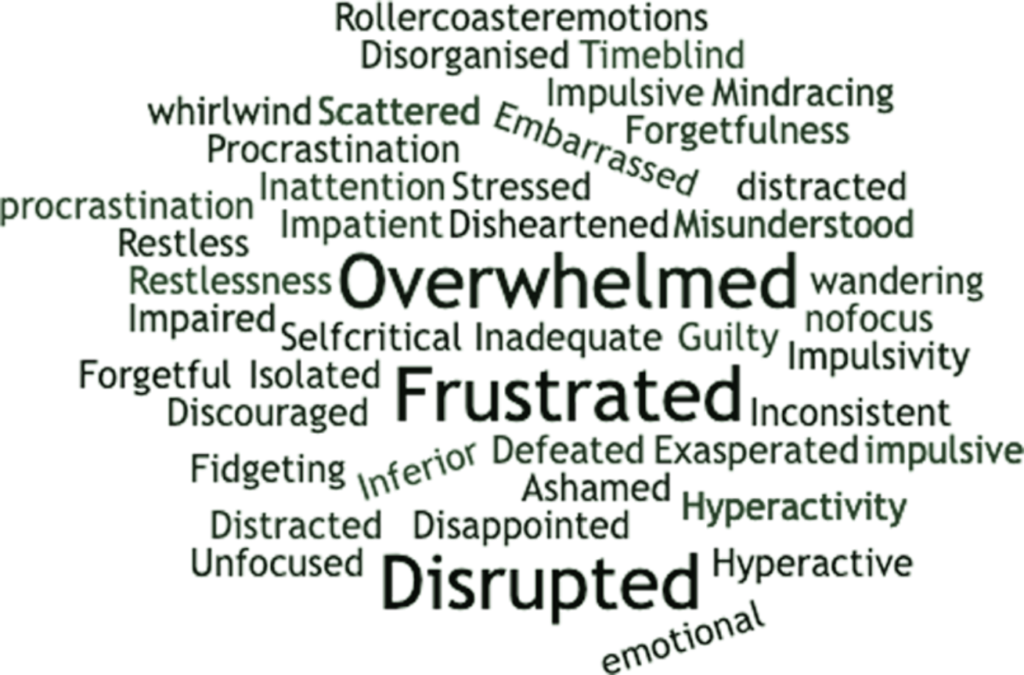Our education system and early intervention for ADHD should go hand in hand. We hear often about the pressure teachers and schools are under – with classroom behaviour and workload taking their toll on the wellbeing of both teachers and students. It seems difficult to imagine how we can create a better environment for our ADHD kids, without adding to that pressure.
Add to this that ADHD can present in many ways during a child’s time at school. Some children will have obvious behaviours that are inappropriate for school, and some children will go somewhat unnoticed for behaviour, while struggling ever more internally.
Lack of resources and funding are seen as the main factors for a lack of ADHD accomodations in schools. And we certainly can empathise with teachers who, in high schools for example, may see hundreds of students per day, for one period each. It is unlikely that any teacher will be able to be across the individual education and accomodation needs of each student, while also being across all of their curriculum needs, safety needs and reporting. It is simply unfair to create that expectation.
However, ADHD accomodations need not be disruptive and can require minimal extra funding. There are relatively simple, individual strategies that are incredibly helpful for both students and teachers – and will positively impact the cohort. We regularly work with students to create plans and strategies for school (and home). We find that when students of all ages are given the ability to define their needs and create their own strategies, they are capable of, and willing to put in the work needed in order to create a better school experience.
The main difficulty we and the students face is a lack of understanding at school, about the nature of ADHD. Accomodations are sometimes viewed as ‘rewarding bad behaviour’ or the idea that the student is choosing to behave in certain ways – with accomodations being used as a reward rather than a necessity. We believe that this is usually due to a simple lack of available quality education for teachers and staff about ADHD. We know that teachers don’t have the time (or energy) to research every challenge, disability, allergy, neurodiversity…. the list is endless, in their spare time. Not to mention discerning from the huge volume of information, what is good quality and what isn’t. What is needed is readily available professional development that gives teachers and staff an essential understanding of ADHD, and a place to seek support and further education.
Senate Report into ADHD – Education Points
With that in mind, you can have a look at some important points from the Senate Report into ADHD here. And we’ll highlight some of the education focussed recommendations and submissions below.
Current Standards
Chapter one lists background information on which the report is based. Under the education section is a short list of current policies and standards, among these is this:
1.81 All education providers from kindy to university are required to comply with the Disability Standards for Education 2005 which require them to provide education in a safe environment and make reasonable adjustments to allow students with disability (including those without a diagnosis)—such as ADHD—to ‘access, participate, and learn on the same basis as students and children without disability’, and with ‘opportunities and choices which are comparable with those offered to students without disability’. This includes consulting with the person with disability, making reasonable adjustments, and eliminating harassment and victimisation.
Lived Experience Submissions
In Chapter two the Lived Experience of ADHD is outlined. In a section specific to education we find:
2.10 Many submissions made by people with ADHD noted that they had great difficulties in school, and despite exhibiting classic signs of ADHD, were instead treated as ‘problem children’
These submissions highlight the shared experience of so many students with ADHD, notably, what should be ‘obvious’ symptoms of ADHD going unrecognised and untreated, these are excerpts from several different submissions:
“School was in general very hard.”
“Most teachers believed I was considerably less intelligent than I was. This led to much of my schooling being in classes which did not fit my needs in terms of learning”, ” I was often put in the “dumb” classes”
“In secondary school I was often put in detention for being late to school.”
“I frequently would not hand in assignments.” “I was failing to complete assignments on time.” “I was finding it difficult to do any of my schoolwork and homework” “I ended up getting detention numerous times throughout high school as I continuously failed to complete my homework”
“I had lost 20+ days of schooling due to absence. How this didn’t raise alarms I am not sure.”
“I was not able to socialise with people”, “I found it extremely difficult to make friends, and I noticed that there was something different about me”
“Sitting through classes was a struggle as I just could not sit there and concentrate”
“I would always get in trouble for talking or drawing in class.“
“In high school my grades fell”
“I began self-medicating with alcohol, drugs, and self-harm, and developed an eating disorder”
“I failed. I just could not absorb the information. I blamed myself and tried to end my life several times”
“I thought I was just bad at life’ and would never amount to anything”
“It literally just goes on and on (consecutive report card comments from teachers regarding her lack of concentration and being distracted) … every subject, every teacher and yet NO ONE saw ADHD because I was inattentive, not hyperactive. Because I didn’t cause any problems in class, any issues with concentration were put down to me not trying, being lazy…”
There are many more – but these snippets really do show the general awareness of ADHD symptoms has been lacking in education, with many kids simply suspended or expelled, or left with mental health problems because of the difficulties they face at school. When recognised and supported, these same students can be successful in their learning and their social abilities.
Whether you’re for medical treatment, against it, or you’re unsure – these personal stories show clear signs that a student requires help and support, not punishment or isolation.
There is hope – with recognition and support
And before we leave thinking that nothing can be done and there is no hope, we also have submissions from those who’s ADHD was recognised and treated. Those are the success stories that every child should be able to achieve:
“With a formal diagnosis I was also able to access supports, including extensions, additional time for test as required and other flexibility in the course”
“My 8yr old daughter was diagnosed with ADHD … Her high levels of anxiety and perfectionism were enabling her to mask all signs of ADHD at school and often at home. It turned out her IQ was in the 97th percentile and yet she was sitting at the 10th percentile for maths for her age”
“I had both maturity, medication and a better understanding of how I best learn due to my ADHD diagnosis.”
“I was able to go back and finish the first degree I had started 7 years before”
State or Federal Government?
There are several recommendations in the report on how to make school a more positive and successful experience for those with ADHD. Much of it comes down to access to reliable education and information for parents and teachers, and asks the Federal Government to take a leadership role in this. Ensuring online information is available and being clear about what the eligibility requirements are for accessing support, and how to access the supports that are available. Schools should also be provided with clearer guidance about how to access additional support from the Students-with-a-disability Student Resource Standard (SRS) loading.
In our view, giving better options for parents, students and schools to become more aware of ADHD, more able to access information and support, and more able to work together, would actually ease the burden of ADHD related challenges for everyone. Instead of each managing (or mismanaging, coping) with ADHD in their own way – spending time and energy on misunderstanding – a cohesive plan could allow each person to understand their role in supporting or living with ADHD, and ease the mental load for everyone.

